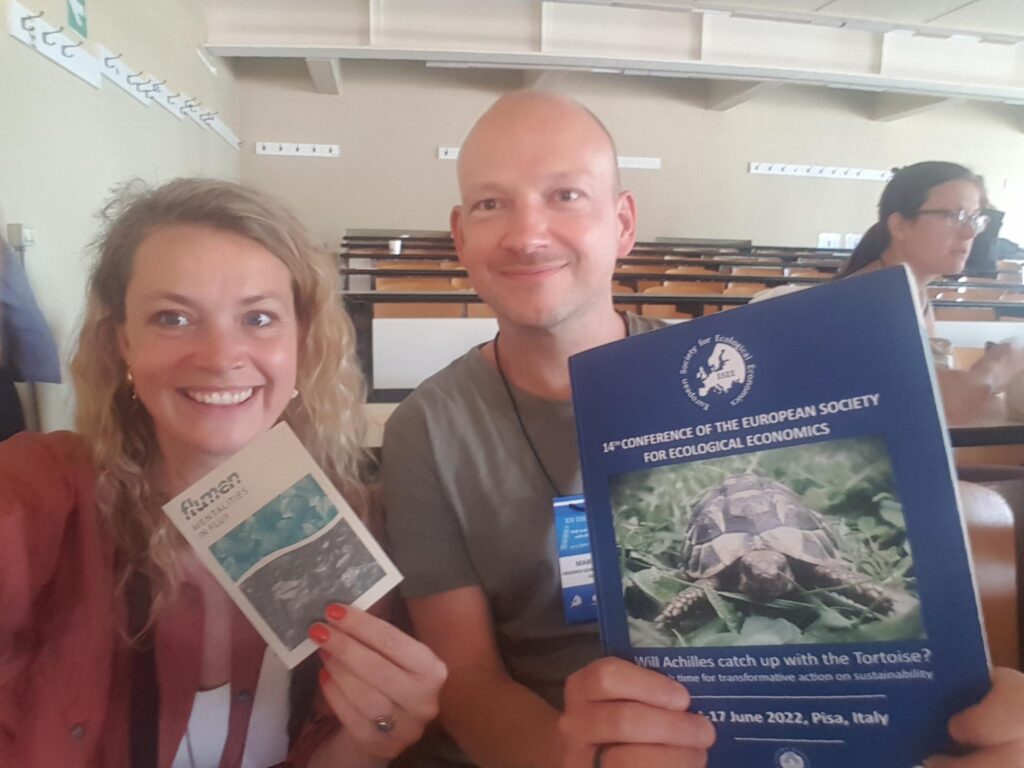
Our flumen-colleagues Lilian Pungas and Martin Fritz presented their work at the ESEE-Conference. Furthermore, Martin moderated the Special Track “From an aspirational policy framework to a real agent of change?”
Lilian Pungas gave the following two lectures:
Who stewards whom? A paradox spectrum of human-nature relationships when working with the soil
This contribution is of empirical nature and based on more than 60 semi-structured in-depth interviews with people that ‘work with the soil’ and practice Food Self-Provisioning (FSP) in Eastern Estonia. The ‘space of social relationships with nature’ is used here as a relational approach to locate various manifestations of care and stewardship to each other and to explore their embeddedness in social relations of power and in specific societal nature relations. Directly perceived experiences and challenges towards nature (be it soil, insects or weather) within the FSP practice bring about manifestations towards nature that can seem paradox at the first sight, that are diverse, dynamic and context-dependent. This relational complexity needs to be considered if we want to overcome destructive human-nature relation(ship)s, in general, and cultivate more sustainable and caring agri-food systems, in particular.
Invisible bioeconomies. A framework to assess the ‘blind spots’ of hegemonic bioeconomy models
As one of the latest buzzwords in agri-food system transformation bioeconomy promises jobs, economic growth and decreased environmental pressure. I will explore the hegemonic narratives and political goals articulated within respective bioeconomy strategy papers of EU (2018) and Estonia (2022) with a specific focus on agriculture and agri-food systems. Doing so I will draw on the Bielefeld subsistence approach and on its three-dimensional colonialism-capitalism-patriarchy nexus. I will demonstrate how 1) different geographical regions, 2) environmental externalities, and 3) widespread BE practices that all contribute to, and constitute the very basis of the hegemonic bioeconomy model, remain unrecognised or devalued as ‚blind spots‘. In fact, current BE models are all built on the prerequisite of the exploitation and devaluation of specific spheres of the BE. As such, the currently proposed bioeconomy models serve as just another label for a ‚green growth‘ program, and will additionally perpetuate the very same power relations while avoiding a ‘genuine’ socio-ecological transformation.
Dr. Martin Fritz presented findings from the representative survey of flumen:
Eco-social mentalities and ways of living in the transformation to an eco-social policy – Empirical findings from a representative survey in Germany 2021/22
An important aspect in eco-social transformations are mentalities and practices. While, for example, mentalities oriented at the growth paradigm and fossil practices like frequent flying are obstacles to the political implementation of an eco-social policy, other more ecological mentalities and caring practices may function as drivers. Based on Bourdieu’s theory of practice and concept of habitus this paper investigates the links between people’s social positions, their eco-social mentalities and practices. In the paper the results of a representative multi-mode survey conducted in Germany 2021/22 are presented. We asked people about social and ecological attitudes, preferences and values, collected data about their everyday practices and their social status and position. Applying dimension reduction methods such factor-, correspondence- and cluster analysis we discover the eco-social mentalities and ways of living that currently exist in Germany and plot them into the space of social positions. Implications for social conflicts and inequalities are discussed.

